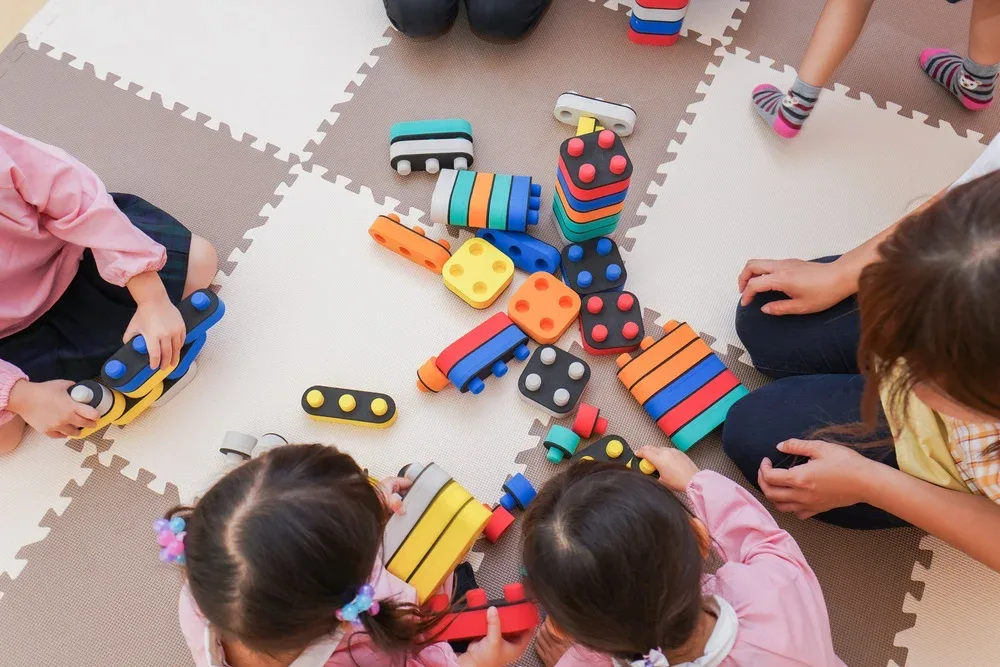
Do babies learn at daycare? In today’s fast-paced world, many parents rely on daycare facilities to provide care and early education for their young children at work. One of the common questions that parents often ask is whether babies learn anything at daycare. This article aims to explore this topic in-depth, examining the various factors that influence learning outcomes for infants in daycare settings.
Contents
What Is Daycare?
Daycare, also known as childcare or early childhood education, refers to a facility where young children are cared for and supervised during the day, typically while their parents are at work. Daycare centers may offer programs tailored to different age groups, including infants, toddlers, and preschoolers.
Benefits of Daycare
Daycare provides numerous benefits for both children and parents. It offers children opportunities for socialization, cognitive stimulation, and emotional development in a structured environment. For parents, daycare offers peace of mind, knowing their child is well cared for while attending to their work responsibilities. Learn more:
Why Daycare Is Good for Toddlers? Top 10 Positive Impacts
Do Babies Learn at Daycare?
Research suggests that babies learn at daycare, although the extent of their learning may vary depending on various factors.
Cognitive Development
Daycare environments often allow infants to engage in age-appropriate activities that stimulate their cognitive development. These activities may include sensory play, exploration of different textures, and exposure to new experiences. Interacting with caregivers and other children can promote language development and problem-solving skills.
Social Skills
One key benefit of daycare for infants is the opportunity to interact with peers in a social setting. Babies learn important social skills through these interactions, such as taking turns, sharing, and cooperating with others. These early social experiences lay the foundation for healthy social development later in life.
Emotional Development
Daycare can also support infants’ emotional development by providing a nurturing and supportive environment where they feel safe and secure. Caregivers in daycare settings are trained to respond to infants’ emotional needs and provide comfort and reassurance when necessary.
Factors Influencing Learning at Daycare
In the dynamic environment of daycare, various factors come into play that shape and influence the learning experiences of young children. From the quality of caregiver interactions to the design of learning environments, each element plays a crucial role in fostering infants’ and toddlers’ cognitive, social, and emotional development.
Understanding these factors is essential for parents and caregivers alike to create enriching and supportive environments that optimize learning opportunities for children during their time in daycare.
Quality of Daycare Environment
The quality of the daycare environment significantly shapes the learning experiences of infants. High-quality facilities provide a safe and nurturing atmosphere and offer stimulating activities and resources that promote cognitive, social, and emotional development.
From well-equipped play areas to age-appropriate toys and materials, these environments are designed to engage infants and encourage exploration and learning.
Interaction with Caregivers
The quality of interactions between caregivers and infants is paramount in fostering a positive learning environment. Responsive caregivers, nurturing, and attention to infants’ needs are crucial in supporting their development. Through gentle and affectionate interactions, caregivers can build trust and security, creating a foundation for infants to explore, learn, and form secure attachment relationships.
Activities and Curriculum
The types of activities and curriculum offered at daycare play a vital role in infants’ learning and development. A well-designed curriculum incorporates stimulating activities tailored to infants’ developmental needs and interests.
These may include sensory play, music and movement, storytelling, outdoor exploration, and art activities. By engaging in such activities, infants have opportunities to develop their cognitive, motor, language, and social skills playfully and interactively.
Research Findings on Babies’ Learning at Daycare
Numerous studies have explored the effects of daycare on infants’ development, yielding valuable insights into the benefits of early childcare. Research consistently indicates that high-quality daycare programs positively impact infants’ cognitive, social, and emotional development.
For example, a longitudinal study conducted by researchers at leading universities found that infants who attended high-quality daycare exhibited better cognitive and language skills than those who did not attend daycare or attended lower-quality programs.
Challenges and Concerns
Despite the numerous benefits of daycare, there are also challenges and concerns that parents may encounter. One common concern is the potential for attachment issues or separation anxiety when infants are enrolled in daycare.
However, research suggests that most infants adjust well to daycare and form secure attachments with supportive caregivers and a nurturing environment. Additionally, parents may worry about their children’s health and safety in a daycare setting, particularly in light of recent public health concerns.
Parents need to vet daycare facilities thoroughly, inquire about health and safety protocols, and communicate openly with caregivers to address any concerns or questions they may have.
Tips for Maximizing Learning at Daycare
To ensure that infants receive the maximum benefit from their daycare experience, parents can implement several strategies:
Choosing the Right Daycare
Take the time to research and visit daycare facilities in your area to find one that aligns with your child’s needs and your family’s values. Look for facilities with qualified, caring staff, a stimulating curriculum, and a safe and nurturing environment.
Communication with Caregivers
Maintain open and regular communication with your child’s caregivers to stay informed about their progress and any concerns that may arise. Building a positive relationship with caregivers can also help support your child’s learning and development.
Engaging in Activities at Home
Supplement your child’s daycare experience by engaging in activities at home that reinforce what they are learning in daycare. This can include reading books together, exploring nature, and engaging in creative play activities.
FAQs
How early can babies start learning at daycare?
Infants can typically start attending daycare as early as six weeks old. However, the exact age may vary depending on the daycare’s policies and the family’s needs.
Is daycare beneficial for infants?
Yes, daycare can benefit infants’ development, providing opportunities for socialization, cognitive stimulation, and emotional support in a structured and nurturing environment.
How can parents support their child's learning at daycare?
Parents can support their child’s learning at daycare by choosing a high-quality facility, maintaining open communication with caregivers, and engaging in activities at home that reinforce learning.
What should parents look for in a quality daycare?
Parents should look for a daycare with qualified and caring staff, a stimulating curriculum, a safe and nurturing environment, and clear communication channels between caregivers and families.
Are there any red flags to watch out for in daycare settings?
Some red flags for daycare settings include high staff turnover rates, safety violations, and a lack of transparency regarding policies and procedures. Parents should trust their instincts and thoroughly investigate any concerns they may have before enrolling their child in a daycare program.
Conclusion
In conclusion, daycare can provide valuable learning opportunities for infants, fostering their cognitive, social, and emotional development in a nurturing and stimulating environment. Parents can ensure that their child thrives in daycare by considering the factors influencing learning, staying informed about research findings, addressing challenges and concerns, and implementing strategies to maximize learning.
Want to put your child in daycare? Look no further. At DeeCyDa Daycare in Irvine, we’re committed to providing a nurturing and safe environment for your little one with our infant care program. Our experienced caregivers, structured routines, and dedication to your child’s well-being make us the top choice for parents like you. Contact us now!

